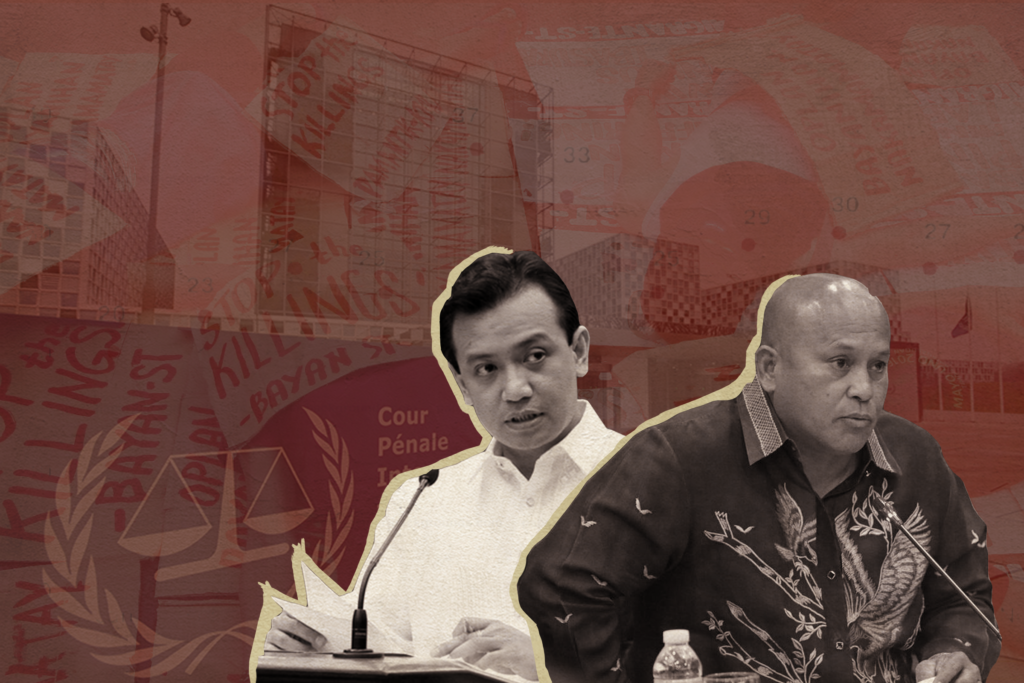From the Newsrooms: January 22 to 27, 2024
Marcos insists on ICC’s lack of jurisdiction

IF FORMER Senator Antonio Trillanes IV is to be believed, the investigative probe of the International Criminal Court into the Philippine drug war is done “as far as the principal accused is concerned,” while the warrant for the arrest of former president Rodrigo Duterte could be served in a few months.
Philippine Daily Inquirer, CNN Philippines’ News Night, TV5’s Frontline Pilipinas and GMA-7’s Balitanghali all carried Trillanes’ information on January 22. Asked by CNN Philippines where he obtained the information, the former senator only described his sources as “very reliable.” TV5 aired his explanation to add that “confidentiality agreements” kept him from saying more about the probe and the supposed arrest warrant to ensure the safety and security of ICC’s witnesses. Earlier this month, Trillanes had already been cited in the news saying that based on his “educated guess,” the ICC has concluded its investigations.
With nothing much to go on, some reports went to Duterte’s allies for comment, citing reactions of his former Cabinet members Harry Roque (in One News and Inquirer) and Salvador Panelo (in Inquirer and TV5) that Trillanes’ claims were speculative. They reiterated as well their old position that the ICC had no jurisdiction in the country.
The information shared by Trillanes riled Senator Ronald “Bato” dela Rosa, chief implementer of the war on drugs when he still headed the national police. Speaking before Senate reporters on January 22, Dela Rosa challenged President Ferdinand Marcos, Jr. to “man up,” and tell Dela Rosa to his face that he was under investigation and could end up in prison. Dela Rosa reminded Marcos that he, the president, had committed to non-cooperation with the ICC.
ANC’s Headstart on January 24 gave Dela Rosa more airtime to express his grievances. Asked by anchor Karen Davila whether he was fearing something in connection to the ICC, Dela Rosa said he was afraid of going to jail not because he did something wrong, but because imprisonment would mean he won’t see his grandchildren again. In telling Dela Rosa’s story, it was all about Dela Rosa, as media who picked up his plaint did not mention the families who lost members during drug operations.
Only The Philippine Star and GMA News Online went back to the source, reporting the statement issued by the ICC that neither confirmed nor denied the entry of their investigators in the country to protect the confidentiality of their work.
BBM insists on non-cooperation
In a chance interview on January 23, Marcos told the media — “for the 100th time,” the country does not recognize the ICC’s jurisdiction and that the court threatens Philippine sovereignty. He added that the government won’t “lift a finger” in helping the international court, saying his directive to government agencies was to refrain from talking with the ICC. But Marcos said ICC representatives can enter the Philippines and visit “on a personal capacity.”
Reporters did not ask whether this order has been put into writing. TV5’s explainer pointed to Marcos’ apparent flip-flopping on the issue, recalling that in November 2023, the president said that rejoining the ICC was under study. The report also recalled that less than two weeks ago, Remulla told Kyodo News that it was “okay” if ICC was getting statements and evidence, although procedural issues needed to be clarified.
CMFR noted in July 2023 that based on what the media reported, the government had not yet fully discussed its next steps after the ICC rejected its appeal to stop the probe. There was no coordination of messages relayed by different officials. In contrast, the surviving families of drug war victims readily expressed solidarity and support for the investigation.
The Philippine Star’s editorial on January 23 made a significant observation: Whether or not the ICC was here, authorities must “speed up and intensify” their own investigations.
At this point, government has lost its credibility in claiming that the judicial system is working and will provide justice for the victims of police operations and their families. So far, there has been little information about the progress in investigating cases of extrajudicial killings and of police violations of their own code of conduct. Despite their assurances and apart from a limited number of cases, government agencies have not shown proof of ongoing investigations and their findings, if any.
It is not just the families who need to know. The public too must be informed about the criminal cases filed in court, and the obstacles that hold back trials and other mechanisms of redress.
Without these visible efforts and without opening the process to the public, government arguments against the value of the ICC fall flat. It has only itself to blame if Filipinos feel that they can get truth and justice only with the help of the ICC.
Leave a Reply